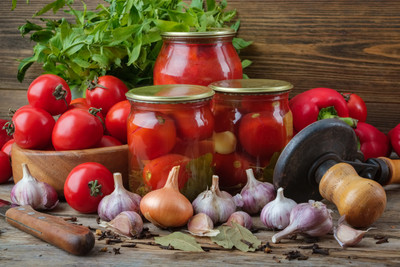Home Preserves The American Way
Posted by The Wares Team on 18th Oct 2019
If you’ve read the title of this blog post, you’re probably feeling a little bemused. Surely, jam is jam and chutney is chutney? Isn’t home preserving exactly the same the world over?
Well, you’d be forgiven for thinking this, but in fact, there’s a lot more to
US-style home preserves than simply rustling up a few jars of jam and some
pickled onions each year. In the States, they take ‘canning’ very seriously
indeed and are really quite adventurous in what they choose to preserve.
So, what is the principal difference between the US and the UK in terms of home preserves? It really is that in the US there is a much stronger focus on preserving foods, rather
than simply making jams, jellies and chutneys. This is because many of these foods
do not have a high acid content or copious amounts of salt or sugar added to
them to preserve them. They need to be treated in a different way in order to
avoid the risks of botulism and other nasties. That’s where canning comes in -
this means processing the jars in a special canner, under pressure. Let’s take
a look at how it works.
It All Starts With Mason Jars
If you are going to pressure can jars of produce, meat, fish, or even prepared items such as bolognese sauce, salsa or stews, then you need to use Mason jars, rather than traditional jam jars. These screw top jars have a two part lid and are made of slightly thicker glass than normal jam jars.
When you’ve packed your screw top jars with food, and carefully screwed on the
lid, it’s time to pop them in the pressure canner, along with water and process
them. Typically, this type of canning requires around 3 minutes at 121° to be
sure of killing all botulism spores that may be present. Pressure canning for
longer than this risks spoiling the food by leaving it tasteless or removing
all nutritional goodness from it.
When you remove the Mason jars from the pressure canner, you should test for a
good seal on the lids. If the seal has worked perfectly, then there should be
no dimple in the centre of the lid. If the lid still dimples, the seal has
failed and you should reject the jar. It’s better to use up a reject jar
straight away, rather than trying to re-can it, as you’d end up pressure
treating the contents twice over, leaving little goodness or taste in the jar.
Label your canned jars and store them in a cool larder or cupboard.
What Can You Can In Mason Jars?
The world really is your oyster when it comes to pressure canning in screw top jars such as Mason jars. Of course, you can still make regular jams, jellies, pickles and preserves, but it doesn’t stop there.
If you love pasta dishes, why not make a huge batch of pasta sauce and can
that, to have to hand all year round? No more reliance on shop-bought
ready-made sauces and pastes - you can make your own!
Try making your own passata too, to use on homemade pizzas, or salsa to use in
fajitas, dips, and much more. Salsa is actually really versatile and it’s great
to have to hand to pep up a midweek meal...try it spooned over chicken breasts
baked in the oven, or add a spoonful to a plate of scrambled eggs for a little
something different.
If you really get into the American style of home canning, you can even can
meat in jars. Try chopping your cuts into cubes, then browning in a pan on all
sides. Once that’s done, pack the meat into clean, sterilised Mason or
Kilner jars, leaving an inch at the top of the jar.
Using the pan you used to brown the meat, add water and bring to the boil, then
use that water (with the meat juices) to fill the jars, again leaving that inch
of space at the top. Wipe the rims clean, then add the lids carefully and
process in the pressure canner.
It’s vital that you use a pressure canner for this and not simply a water bath,
as only a canner will reach a high enough temperature to be sure of killing any
bacteria. Use your canner’s instruction manual to work out how long to process
for. Again, once processed, test for a good seal, before labelling and storing.
Hopefully, we’ve given you a good idea as to just what the Americans mean when
they talk about canning and shown how different it is to what most people think
of in terms of home preserving. Why not check out our range of Mason jars,
Kilner jars and other screw top jars if you are considering exploring this type
of canning?
And if you are already a canning expert, why not share your experiences with us
via
Facebook, Twitter or Instagram? We’d love to hear from you!

